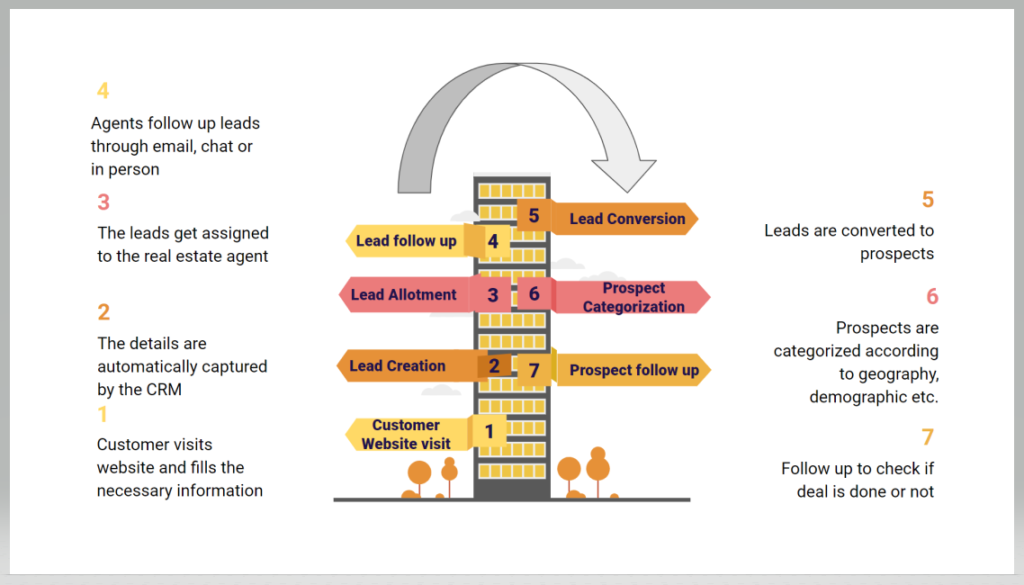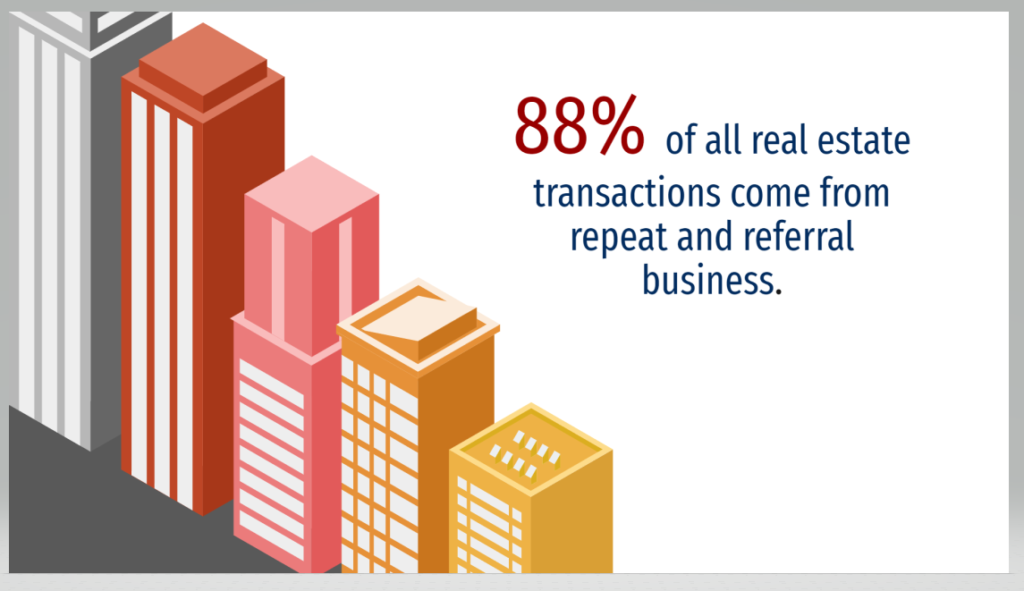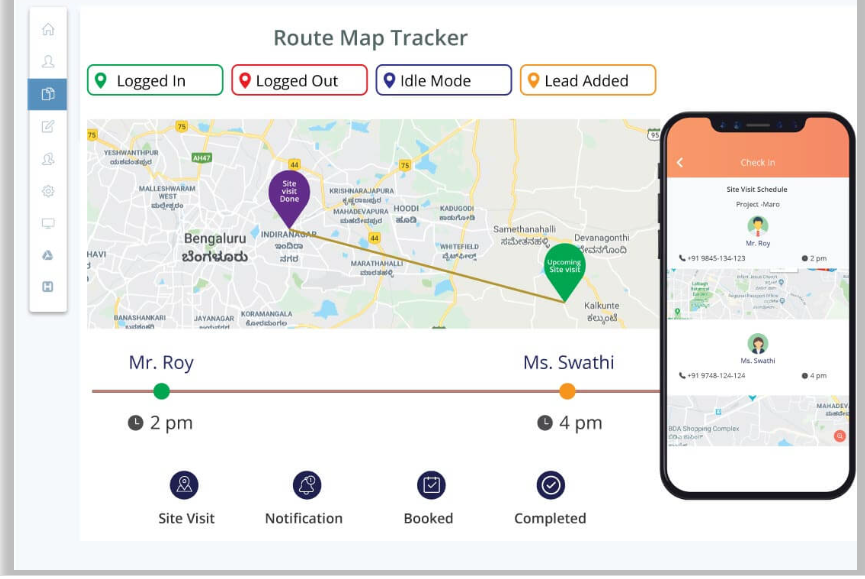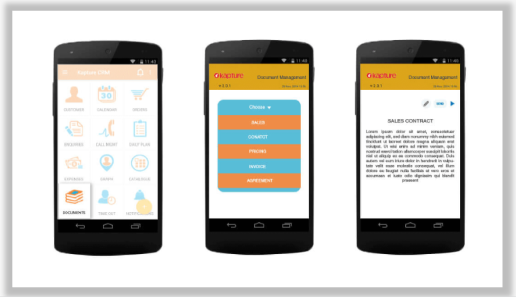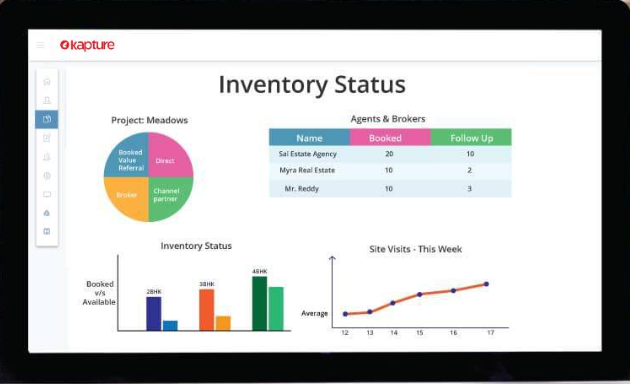The real-estate sector experienced a healthy rebound globally in 2021 after the COVID-19 imposed pandemic. Reports by PwC revealed that the global commercial sales volumes exceeded the 2020 total by 59% in 2021.
While we experience an upsurge in the real estate sector, the ride is far from over when your business can suffer relapses or misfortune with ineffective customer relationship management.
What is a Real Estate CRM?
Real estate CRM is a piece of software that manages customer relationships in the real estate industry, touching every aspect of it.
Real estate Customer Relationship Management software offers a solution to mismanagement errors, inaccuracies in dealings, manual intervention slips, marketing lapses, flawed process management, and just about everything.
It gives you the much-needed dynamism to keep going in the right direction to thrive in the real estate business.
In this blog, we will look at the best ways to manage customer relationships with a real estate CRM that’s cloud-based.
A choice commonly preferred by realtors as opposed to stand-alone desktop applications running on on-premise systems.
Image: CRM touchpoints in Real Estate Process Management
10 tips to Manage Customer Relationships with Real Estate CRM
1. Manage Lead Capture
Leads can be captured and directed to the CRM dashboard from a variety of sources, including websites, landing pages, social media, and third-party portals.
Based on preset criteria such as projects, geography, budget, customer type, or agent availability, the leads are automatically assigned to real estate agents for follow-up.
This makes sure that your most valued & loyal customers get the right attention.
2. Anticipate Client Requirements to Improve Lead Capture
Customers may refuse to purchase your products or services if they believe you are not providing them with the degree of satisfaction they desire in terms of their buying requirements.
You are making wrong moves, for instance, if your client needs a property by a water body and you attempt to make property deals in a crowded metropolis.
Unfortunately, you won’t know what your target clientele wants unless you ask them, but a real estate CRM can tell you about their preferences based on their website activity.
With CRM data, you can track customers’ activities and learn what they like and dislike. Utilize this information to improve how you sell your products.
Real estate CRM software, helps you maintain a wealth of information about clients’ preferences and habits to enable you to create a customized plan to persuade them into buying. You can gradually boost your odds of turning leads into actual sales by using such data at work.
Going above and beyond in anticipating client needs shows a customer that they are significant and valued, which leads to loyalty, referrals, and long-term agent/client relationships.
Statistics: source
3. Quickly Follow Up on Leads
Real estate CRM serves as a one-stop contact and information database that stores prospects and clients’ data at a centralized location.
Here are the advantages of storing information in a centralized location and accessing it via the internet:
- Not having to sift through many screens, old emails, or spreadsheets to get client or prospect information.
- When you can access customers’ previous interactions with a single click, you can respond to consumer queries with suitable context.
- With a 360-degree picture of customer profiles, you can better understand your customers. You can communicate and engage with customers better when you know them better.
- Also, use the real estate CRM’s mobile apps to contact customers from wherever you are.
4. Provide the Most Effective Self-Help Resources
Make sure your communication policy is customer-friendly. Since real estate isn’t a 9 to 5 job, make sure your agents are ready for some after-hours queries to close the deal.
Provide your employees with flexible work practices, such as remote work alternatives via mobile devices.
Make it easy for customers to find your contact information on your website as well as provide customers with self-help resources.
To assist your clients with frequent questions, Kapture Real estate CRM offers powerful self-help tools such as
- AI-powered chatbots that answer common consumer inquiries about project delivery dates, discounts, and payment options, among other things.
- A knowledge base (a centralized repository for storing information in the form of documents, articles, or videos) that clients and agents can seek assistance from, by accessing through self-serve portals.
5. Manage Communication Across Multiple Channels
Integrate your Real Estate CRM with the call, chat, email, mobile app, social media, or your website to communicate with customers.
Real estate CRM can log clients’ calls in its help desk as well as route calls automatically to an available agent who can assist the clients. This will make them feel special and help you enhance customer service.
6. Create Tailored Lead-Generating Campaigns
Customer data in real estate CRM can be segmented based on demographics and properties.
Successful segmentation divides your consumer data into groups, allowing you to use dynamic content and personalization strategies to send out marketing communications that are more timely, relevant, and effective.
This is something that can assist you in optimizing your marketing strategy, maximizing the value of/to your business from customers, and improving customer experience.
Businesses can also utilize segmentation for the following reasons:
- Make better use of their marketing resources
- Get a competitive advantage over competitors
- A deeper understanding of customers’ requirements and wants
This improves customer engagement levels and helps build better relationships.
7. Monitor Customer Journey
Make sure your team takes the time to walk clients through the entire selling process, especially first-time purchasers.
You can work with your agents to prepare resources that can be provided to clients at various phases of the customer journey to maximize efficiency.
You might make educational movies that clients can watch at their leisure after being emailed. Also useful are FAQ documents or other written guides.
8. Email Your Customers in Bulk at the Right Time
Real estate CRM enables you to send bulk emails in numbers that are impossible to achieve with standard email systems.
Bulk emailing is the most cost-effective way to reach out to new customers and close sales quickly. Customizable email templates can be used to frame messages, saving even more time and effort.
In short, bulk email software allows you to send personalized messages to a specific audience. Most importantly, it allows you to track your campaigns’ engagement and purchases.
9. Store Extensive Customer Data
Real estate CRM systems can track and retain a lot of information while keeping it structured and simple to use.
Create and manage 360-degree customer profiles by saving all essential information on a prospect or client, including detailed demographic, psychographic, and behavioral information.
10. Manage your Calendar
Based on the leads that have been assigned to you, the real estate CRM system will create your daily calendar for site visits.
Clients can receive automatic SMS and emails informing them of site visits, while you are notified via the mobile app.
Transport pick-up and drop-off configurations are also available in Kapture’s real estate CRM.
Keeping on top of your daily schedules will ensure that customers are not inconvenienced in any way.
Image: Route map tracker
Why is Customer Relationship Management important for the Real Estate Industry?
A real estate CRM improves customer relationships through personalization, better engagement, and faster communication.
However, it offers numerous other benefits that increase the productivity and efficiency of your business.
Read on to learn about this.
1. Coordinate with other real estate players
Manage leads that come in through real estate players such as brokers, other real estate companies, or partners. Get notified when a broker generates leads, modify your commission structure, and even track conversions through your partners.
2. Upload documents and contracts
Important papers, policy templates, and agreement copies can all be stored in the real estate CRM database and accessible over the internet. To reduce the laborious work of sharing papers, auto-email can be used at the appropriate lead stage.
Image: Document access via mobile app
3. Maintain inventory
From a single dashboard, access the inventory of all projects, including rates, floor plans, and properties sold, booked, or overdue. With a real-time database syncing, you’ll get a clear view of all your available property listings.
A real estate CRM allows sharing of marketing collateral with one click straight from your mobile application. In this way, you won’t have to dig out multiple sheets and files to present information to your clients.
Image: Inventory status
4. Manage Payment schedule and tax structure
Handle payments across numerous projects, and track the status of completed, pending, and late payments. Set up automatic payment reminders for customers.
Configure tax structures, variable rates by property floor plan or location, and clubhouse, maintenance, and parking pricing schemes.
With an easy-to-use payment engine, you can easily compute brokerages and commissions from property acquisitions and completed payments.
Customize the commission structure for each successful transaction and have the final amount calculated automatically.
5. Stay on top of real estate trends with the intuitive dashboard
The revenue dashboard gives a clear picture of your lead progress, conversions, inventory status, payments, and income in the pipeline. Make plans to sell off properties more quickly and extend offers to new prospects.
Map out your agents and brokers to determine how they offer value to the sales funnel.
6. Cross-device compatibility
Get your real estate CRM on your phone so you can keep track of your site visits in real-time. Also, while managing several projects at separate places, get a bird’s eye perspective of your team’s or agent’s current location. While you’re on the go, this might assist you to assign leads based on their present position.
Once you’ve attended to your client, the Kapture Real Estate CRM software allows you to check in and check out on your mobile device.
Also, send meeting minutes, floor plans, project brochures, bids, reports, and project plans via the mobile app.
The Kapture mobile app can be used offline, and updates are synced whenever you connect to the internet.
7. Project Analysis
Create a project checklist and track its progress step by step, which is especially useful when your project has multiple parts. Real estate managers and supervisors can easily add tasks to the checklist and check them off on completion.
Track project availability (sold or booked) and even set up the CRM to check the status of completed, in-progress, or future projects. Keep track of expected completion dates, floor plans, and cost sheets, among other things.
Image: Project availability tracker
8. Automate Daily tasks
Frequent activities and work routines like emailing possession dates, onboarding new clients, and generating sales reports can all be automated. Within the real estate CRM, tasks can be scheduled to repeat at a predetermined time.
9. Measure your performance and forecast growth
With source- and employee-level lead status reports, you can see how well your real estate salespeople are performing with clients.
Check the number of leads acquired, the number of clients met, the number of converted and rejected leads, and so on.
Create customized reports depending on channel, team, location, or another attribute. To track your sales performance, create daily, weekly, monthly, or annual reports.
10. Manage marketing campaigns
Real estate CRM also aids in scheduling, monitoring, and optimizing online marketing and digital campaigns. The CRM dashboard shows how many emails have been read, opened, or bounced. You’ll be able to check statistics and practically monitor your business improvement once your campaign is up and running using email automation and social media campaigns.
Gif: source
A typical day in the world of real estate involves prospecting, promoting yourself, tracking leads, dealing with complex paperwork, providing customer service, and so much more.
Not to mention keeping track of a hefty number of properties, a huge inventory of real estate listings, and thousands of contacts all in one spot. That’s where Kapture’s real estate Customer Relationship Management can help.
CRM systems enhance customer relationships while making sales processes easier for you and your team. When it comes to succeeding in the long-lived and capital-intensive real estate industry, CRM is the key. Book a demo of Kapture to know more.
About the Author | |
 | Seema C Mohan |
| Seema C Mohan is passionate about all things XaaS and loves to write value-added content. She has been in Business Process Management in the past and has published technology articles in journals. | |
,
,
,
,
,
,
,
,
,
,
,
,
,
